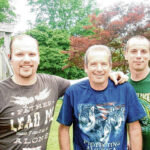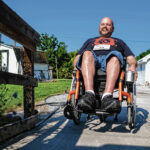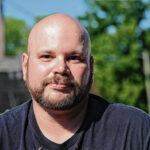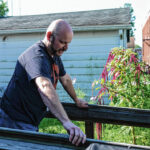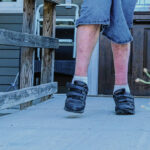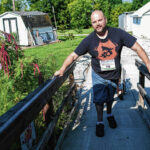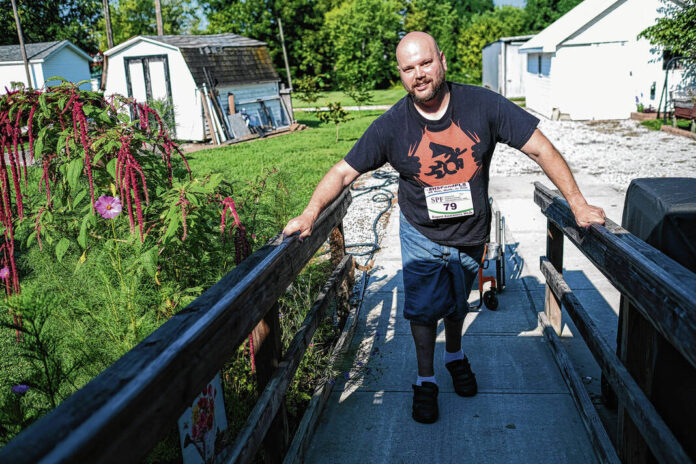
Mike Wolanin | The Republic Kyle Alumbaugh demonstrates how he uses his wheelchair ramp participate in 5k run, walk or roll to raise awareness for Hereditary Spastic Paraplegia and Primary Lateral Sclerosis at his home in Westport, Ind., Thursday, Aug. 25, 2022. Alumbaugh, along with his father and Jack and brother Ben have Hereditary Spastic Paraplegia.
WESTPORT – It may be one of the most debilitating diseases most people have never heard about.
Although Westport resident Kyle Alumbaugh, 43, suffers from hereditary spastic paraplegia (HSP), he has become a significant part of a fundraising and awareness campaign that has attracted more than 4,000 members to a social media site he oversees.
Alumbaugh describes HSP as a rare, neuro-muscular, hereditary, progressive and leg-crippling disease. In regard to how many people have it, the Spastic Paraplegia Foundation says misdiagnosis makes estimates range from one in 11,000 people, to one in 77,000.
However, one thing is certain. When HSP does emerge, the degenerative neurological disorder can affect members of the same family.
Alumbaugh says his now-69-year-old father, Jack, discovered he had the genetic defect when he was a boy.
“When he became an adult, Dad was still able to work some good factory jobs,” Kyle Alumbaugh said. “But this was before the (1990) Americans with Disabilities Act. By the time Dad reached his early 30s, he couldn’t walk and was placed on disability.”
Jack Alumbaugh’s sons, Ben and Kyle, were born three years apart. However, family members said it was obvious there was something wrong. Kyle said he was born with his left foot turned at a 90-degree angle.
The original diagnosis was that the boys had cerebral palsy. But that made no sense to Jack Alumbaugh, who knew cerebral palsy isn’t passed on from one generation to another. So he took his sons to Riley Hospital for Children in Indianapolis, where the family received confirmation that both boys, as well as their father, were suffering from Hereditary Spastic Paraplegia, Kyle Alumbaugh said.
When Kyle was 14, he was sent went to the Mayo Clinic and underwent surgery on a tendon that allowed his left foot to extend flat.
For a period of time, Kyle and Ben were able to be enjoy participating sports and other physical activities with only minor limitations, Kyle said. But he added he never forgot the warning from Mayo Clinic physicians that their recovery might be short-lived due to the progressive nature of the disease.
The doctors were correct. Kyle Alumbaugh made it to his early 20s before the disease forced him to begin walking with a cane. By his late 20s, he was using both a walker or a cane, depending on his level of activity.
But Alumbaugh refused to compromise on his quality of life. When he was in his early 30s, he enrolled at IUPUC. After a number of falls on the campus, the Westport resident went to his classes using a wheelchair.
When out in public, Alumbaugh noticed some people are afraid they might offend him by asking about his mobility limitation. As a result, many assumed he was injured in combat. But the Westport man says it never bothers him to talk to others about HSP and about the disease’s impact on his family, and others facing the same challenges.
After finishing classes, Alumbaugh was awarded a bachelor’s degree in business with an emphasis on marketing. But even with the degree, being disabled still led to many closed doors.
But Alumbaugh said he refused to let that get him down. He received valuable support and encouragement from his wife, Westport Clerk-Treasurer Gloria Alumbaugh. But he credits his own drive and Christian faith for the belief that he was going to become a positive influence to others.
Alumbaugh discovered the Spastic Paraplegia Foundation, which has been helping those with HSP and those with a similar disease, Primary Lateral Sclerosis, for 20 years. Known as PLS, this disease has been referred to as a benign variant of Lou Gehrig’s disease. Those who suffer from this hereditary disease usually don’t start showing symptoms until they are between 35 and 66 years old, according to the foundation’s website.
After joining the Fremont, California foundation, Alumbaugh was placed on the staff as social media coordinator. Along with other volunteers who organized fundraising events, Alumbaugh helped raise $1.2 million during last fall’s “Giving Tuesday” fundraiser – $300,000 more that the previous year.
Each contribution goes to the Spastic Paraplegia Foundation, which uses the donations to issue research grants that they hope will lead to a medical breakthrough to cure the two diseases.
During the month of August, the foundation sponsored a fundraising event called the 5K Run, Walk or Roll that raised more than $50,000.
Alumbaugh decided he wanted to inspire others during the event by participation. He would shoot video of himself walking up and down a wooden walkway with handrails, with one round trip equaling 28 feet.
On good days when he feels up to the task, Alumbaugh can make it up and down the walkway 30 times. But on days when the pain in his lower leg becomes unbearable, the Westport will still do seven or eight round trips, he said.
The video is used in short, but well-produced Facebook programs titled “Kyle’s Talk and Walk.”
While the walking footage is in the lower right-hand screen, the main focus on the left side is Alumbaugh speaking words of encouragement to those with the disease, as well as donors and supporters.
After taking over a dozen walks in August and raising nearly $2,000 himself, Alumbaugh has announced he will continue his fundraiser through the month of September. Along with family and friends, Alumbaugh’s fundraising sponsors include Gross Self Storage in Columbus, Bass and Gasper Funeral Home in Westport and Layman Hummel Insurance in North Vernon.
While the motto for the national foundation’s 5K programs is “Celebrating Victory,” Alumbaugh urges those with the diseases who are following his progress on social media to “be a beacon of hope.”
In large part, being a beacon of hope means not allowing HSP or PLS to fill you with depression and despair, he said.
“If we change our mindset and focus on joy in our challenges, we can excel to great victories,” Alumbaugh said.
How to help
To donate online, go to sp-foundation.org, click the Get Involved menu and select Donate Here.
On Facebook, you can view Kyle Alumbaugh’s video messages by visiting the ‘Spastic Paraplegia Foundation, Inc #HSPandPLS’ page.
You can also email Kyle Alumbaugh directly at [email protected]
Photo provided Kyle Alumbaugh, his father Jack and brother Ben, left-right, all have been diagnosed with hereditary Spastic Paraplegia.
Mike Wolanin | The Republic Kyle Alumbaugh pops a wheelie in his wheelchair at his home in Westport, Ind., Thursday, Aug. 25, 2022. Alumbaugh, along with his father and Jack and brother Ben have Hereditary Spastic Paraplegia. He organized a 5k run, walk or roll to raise awareness for the disease and Primary Lateral Sclerosis.
Mike Wolanin | The Republic Kyle Alumbaugh poses for a portrait at his home in Westport, Ind., Thursday, Aug. 25, 2022. Alumbaugh has a disease called Hereditary Spastic Paraplegia. He organized a 5k run, walk or roll to raise awareness for Hereditary Spastic Paraplegia and Primary Lateral Sclerosis.
Mike Wolanin | The Republic Kyle Alumbaugh demonstrates how he uses his wheelchair ramp participate in 5k run, walk or roll to raise awareness for Hereditary Spastic Paraplegia and Primary Lateral Sclerosis at his home in Westport, Ind., Thursday, Aug. 25, 2022. Alumbaugh, along with his father and Jack and brother Ben have Hereditary Spastic Paraplegia.
Mike Wolanin | The Republic Kyle Alumbaugh demonstrates how he uses his wheelchair ramp participate in 5k run, walk or roll to raise awareness for Hereditary Spastic Paraplegia and Primary Lateral Sclerosis at his home in Westport, Ind., Thursday, Aug. 25, 2022. Alumbaugh, along with his father and Jack and brother Ben have Hereditary Spastic Paraplegia.
Mike Wolanin | The Republic Kyle Alumbaugh demonstrates how he uses his wheelchair ramp participate in 5k run, walk or roll to raise awareness for Hereditary Spastic Paraplegia and Primary Lateral Sclerosis at his home in Westport, Ind., Thursday, Aug. 25, 2022. Alumbaugh, along with his father and Jack and brother Ben have Hereditary Spastic Paraplegia.

